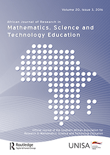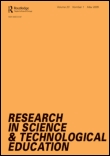
African Journal of Research in Mathematics Science and Technology Education
Scope & Guideline
Elevating Research in Mathematics and Technology Education
Introduction
Aims and Scopes
- Integration of Indigenous Knowledge Systems (IKS):
The journal emphasizes the importance of incorporating indigenous knowledge into mathematics and science education, promoting culturally relevant pedagogies that resonate with local communities. - STEM Education Enhancement:
There is a strong focus on improving STEM education in Africa, exploring innovative teaching methods, curriculum development, and the use of technology to enhance student engagement and learning outcomes. - Teacher Professional Development:
The journal addresses the continuous professional growth of educators, examining effective training programs, teacher beliefs, and pedagogical content knowledge to improve teaching practices in various subjects. - Research on Learner Understanding and Misconceptions:
It investigates students' conceptual understanding, common misconceptions, and effective strategies to enhance learning, particularly in mathematics and science subjects. - Use of Technology in Education:
The journal explores the integration of digital technologies in the classroom, analyzing their impact on teaching methods and student learning experiences.
Trending and Emerging
- Decolonization of Education:
Research focusing on decolonizing curricula and integrating indigenous knowledge systems has gained traction, highlighting the need for education that reflects local cultures and histories. - Use of Generative AI Tools:
The examination of generative AI tools in educational settings, such as ChatGPT in mathematical problem-solving, indicates a growing interest in the role of technology in enhancing learning and teaching. - Entrepreneurship in Education:
There is an increasing focus on embedding entrepreneurship within technology education, recognizing its importance in preparing students for real-world challenges and economic participation. - Exploration of Learner Errors and Misconceptions:
Recent publications emphasize a deeper understanding of learners' errors and misconceptions, particularly in mathematics, suggesting a trend towards more diagnostic and formative approaches to teaching. - Blended and Online Learning Approaches:
The rise of blended and online learning methodologies, particularly in light of the COVID-19 pandemic, reflects a significant trend towards flexible and accessible education models.
Declining or Waning
- Traditional Lecture-Based Teaching Methods:
There appears to be a decline in research focused on traditional, lecture-based teaching methods, as the emphasis shifts towards more interactive and student-centered pedagogies. - Generic Science Education Research:
Research that does not specifically address the African context or localized educational challenges seems to be decreasing, suggesting a move towards more contextually relevant studies. - Standardized Testing and Assessment Practices:
There is less emphasis on standardized testing and conventional assessment practices, as the journal increasingly favors innovative assessment strategies that cater to diverse learner needs.
Similar Journals

Research in Science & Technological Education
Empowering Educators with Cutting-Edge InsightsResearch in Science & Technological Education, published by Routledge Journals, Taylor & Francis Ltd, is a leading international journal dedicated to advancing the field of education within the realms of science and technology. With its ISSN 0263-5143 and E-ISSN 1470-1138, this prestigious journal provides a platform for innovative and rigorous research from 1983 to the present, thus offering critical insights into pedagogical practices, curriculum development, and policy-making. Boasting a remarkable impact, it ranks in the top quartile (Q1) in both Education and Multidisciplinary categories as of 2023, with an impressive Scopus ranking of #270 out of 1543 in Social Sciences _ Education, placing it in the 82nd percentile. Researchers, educators, and students will find invaluable resources and discussions that shape the future of science and technological education in an increasingly complex world. Although this journal does not offer Open Access, it maintains a strong commitment to disseminating high-quality research, making it an essential read for those invested in the evolution of educational practices and outcomes in the STEM fields.

REDIMAT-Revista de Investigacion en Didactica de las Matematicas
Shaping the Future of Mathematics LearningREDIMAT-Revista de Investigacion en Didactica de las Matematicas, published by HIPATIA PRESS, is a leading open-access journal dedicated to advancing research in mathematics education, particularly focusing on didactic methodologies and pedagogical innovations. Since its inception in 2012, the journal has fostered an inclusive platform for academics, educators, and practitioners to disseminate their findings and insights, significantly contributing to the field of mathematics education. With an ISSN of 2014-3621, REDIMAT aims to promote high-quality research and collaboration across diverse educational contexts. The journal not only emphasizes empirical studies but also theoretical developments and practical applications that enhance teaching and learning of mathematics worldwide. By providing a valuable resource for researchers, professionals, and students alike, REDIMAT plays a pivotal role in shaping the future of mathematics education research.

Journal of Mathematics Teacher Education
Shaping the Future of Mathematics Education WorldwideJournal of Mathematics Teacher Education, published by SPRINGER, serves as a pivotal platform for scholarly communication in the fields of Education and Mathematics. With a distinguished Q1 ranking in both disciplines and exceptional Scopus rankings—placing it in the top 94th percentile for Mathematics and the 84th percentile for Education—the journal is dedicated to advancing research and practice in mathematics education from a global perspective. Established in 2005 and converging towards 2024, it invites contributions that investigate innovative teaching strategies, curriculum development, and teacher education methodologies. Although the journal does not offer Open Access, its rich collection of empirical studies, reviews, and theoretical articles provides invaluable resources for educators, researchers, and students aiming to elevate the quality of mathematics instruction. Situated in Dordrecht, Netherlands, the Journal of Mathematics Teacher Education remains a significant asset to the academic community, fostering discussions that drive progress and enhance student learning experiences.

Abakos
Exploring the frontiers of biology and interdisciplinary studies.Abakos is a prominent academic journal published by the Pontificia Universidade Catolica de Minas Gerais, focusing on the fields of biological sciences and interdisciplinary studies. Since its transition to Open Access in 2012, the journal has committed itself to the dissemination of high-quality research, providing unrestricted access to innovative findings that advance knowledge in various biological disciplines. Located in Belo Horizonte, Brazil, Abakos invites submissions that address critical issues in the biological sciences, encompassing molecular biology, ecology, and biodiversity, thus contributing to the global dialogue on environmental and health challenges. With an emphasis on advancing research and fostering collaboration among scholars, Abakos serves as an essential platform for researchers, professionals, and students aiming to share their insights and promote scholarly communication in an increasingly interconnected world.

Revista Latinoamericana de Investigacion en Matematica Educativa-RELIME
Empowering Educators Through Open Access ResearchRevista Latinoamericana de Investigacion en Matematica Educativa (RELIME) is a pivotal open access journal dedicated to advancing research in mathematics education across Latin America. Published by the Comité Latinoamericano de Matemática Educativa (CLAME) since 1997, this journal aims to provide a platform for innovative research, theoretical discussions, and methodological advancements in the field. With an ISSN of 1665-2436 and E-ISSN of 2007-6819, RELIME contributes to the scholarly discourse on educational practices and policies, seeking to enhance the quality of mathematics education. Although currently ranked in the fourth quartile in Education by Scopus, with a social sciences education rank of #1153/1543 (25th percentile), the journal's Open Access policy ensures that research is widely available, thereby fostering collaboration among researchers, educators, and policymakers. Located in Mexico, the journal also emphasizes the unique challenges and successes within the Latin American educational context, inviting submissions that explore local, regional, and broader educational paradigms.

Educational Studies in Mathematics
Transforming Mathematics Education Through Insightful StudiesEducational Studies in Mathematics, published by Springer, is a prestigious journal dedicated to advancing the field of mathematics education. With an impressive impact factor and a distinguished Q1 ranking in both the Education and Mathematics categories as of 2023, the journal plays a vital role in disseminating high-quality research and innovative methodologies. Since its inception in 1968, it has continually provided a platform for educators, researchers, and policymakers to explore the multifaceted relationship between mathematics and education, emphasizing theoretical frameworks, practical applications, and empirical studies. Situated in the Netherlands, this journal boasts a remarkable reputation with its Scopus rankings, placing it among the top percentile in both Mathematics and Social Sciences. Although it does not currently offer open access, Educational Studies in Mathematics remains a crucial resource for those committed to enhancing mathematics education globally.

International Journal for Technology in Mathematics Education
Innovating the future of mathematics education.International Journal for Technology in Mathematics Education (ISSN: 1744-2710, E-ISSN: 2045-2519) is a pioneering platform published by Research Information Ltd that focuses on the interplay between technology and mathematics education. Established to bridge the gap between pedagogical practices and technological advancements, this journal connects researchers, educators, and practitioners in a bid to enhance teaching methodologies and optimize learning outcomes in mathematics. Although its coverage in Scopus was discontinued after 2020, it continues to be a vital resource for those interested in the integration of technology into educational settings. With its significant emphasis on interdisciplinary approaches, the journal has garnered attention in the realms of social sciences and computer science, with Scopus rankings reflecting its niche contributions. This journal is crucial for professionals aiming to explore innovative techniques in mathematics education, making it an invaluable addition to any academic library.

Cukurova University Faculty of Education Journal
Catalyzing Change in Educational Theory and PracticeThe Cukurova University Faculty of Education Journal, published by CUKUROVA UNIV, serves as a vital platform for scholarly discourse in the field of education. With the ISSN 1302-9967, this journal is dedicated to publishing rigorous research and innovative studies that address critical issues within educational theory and practice. Though the publication operates on a closed-access model, it remains committed to enhancing accessibility by providing high-quality, peer-reviewed content that contributes to the body of knowledge in education. Situated in Adana, Turkiye, the journal aims to foster collaboration among researchers, educators, and policymakers, ultimately enriching the educational landscape. As an essential resource for those invested in advancing pedagogical methods and educational policies, the Cukurova University Faculty of Education Journal is poised to make significant contributions in its field.

International Journal of Science and Mathematics Education
Empowering Educators Through Innovative ResearchWelcome to the International Journal of Science and Mathematics Education, an esteemed publication that has served as a vital platform for cutting-edge research in the fields of science and mathematics education since its inception in 2003. Published by SPRINGER in the Netherlands, this journal has consistently established itself in the top tier of academic publishing, as evidenced by its ranking in the Q1 category for both Education and Mathematics (miscellaneous) in 2023. With an impressive Scopus ranking placing it at #26 in General Mathematics and #269 in Social Sciences Education, the journal is a must-read for researchers, educators, and policymakers dedicated to enhancing the teaching and learning of mathematics and science. Although not open access, the journal is committed to disseminating high-quality research that bridges theory and practice, fostering innovative approaches and collaboration within the academic community. By supporting empirical studies, methodological advancements, and theoretical discussions, the International Journal of Science and Mathematics Education plays a crucial role in shaping educational practices and policies worldwide.

Australian Journal of Teacher Education
Advancing teacher education through innovative research.Welcome to the Australian Journal of Teacher Education, a leading scholarly publication dedicated to advancing the field of education through innovative research and impactful discourse. Published by Edith Cowan University, this journal serves as a vital platform for educators, researchers, and practitioners to share their findings and insights in the sphere of teacher education. With a commendable Q2 ranking in Education and recognition within the 45th percentile of Scopus's education category, the journal underscores its commitment to maintaining rigorous academic standards while embracing the burgeoning landscape of teacher training and curriculum innovation. Since its inception in 2008, the journal has provided an open access format to its readers, facilitating unrestricted dissemination of knowledge across Australia and beyond. Set against the backdrop of Australia's vibrant educational research community, the Australian Journal of Teacher Education is pivotal for those seeking to engage with current trends and methodologies in teaching and learning.